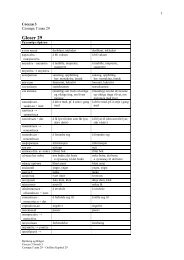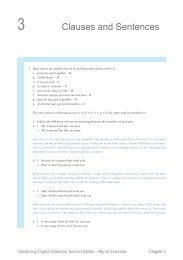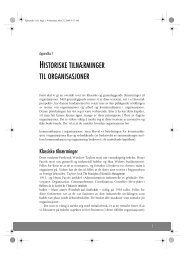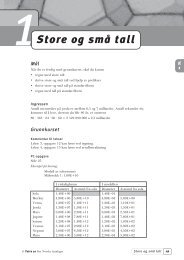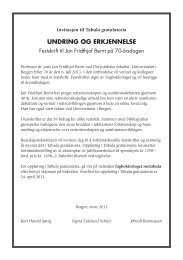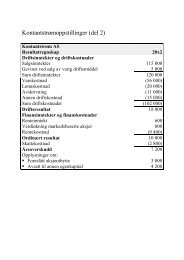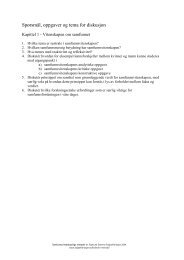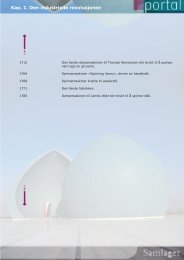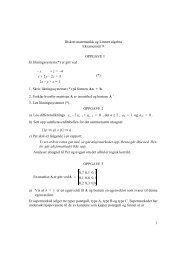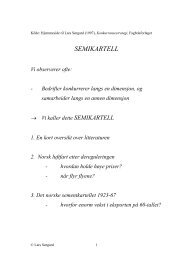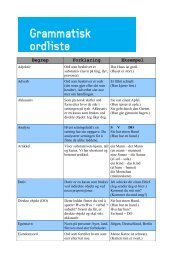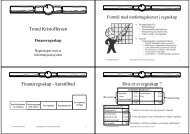price discrimination in the airline industry - Fagbokforlaget
price discrimination in the airline industry - Fagbokforlaget
price discrimination in the airline industry - Fagbokforlaget
You also want an ePaper? Increase the reach of your titles
YUMPU automatically turns print PDFs into web optimized ePapers that Google loves.
city pair market and <strong>the</strong> importance of a frequent flyer program for a passenger’s choiceof airl<strong>in</strong>e. They demonstrate <strong>in</strong> <strong>the</strong> empirical part of <strong>the</strong>ir study <strong>the</strong> dramatic impact offrequent flyer programs on carrier choice for <strong>in</strong>dividual flights. Fur<strong>the</strong>rmore, <strong>the</strong>y foundthat <strong>the</strong>se effects are particularly strong among <strong>the</strong> frequent bus<strong>in</strong>ess traveler.The latter result is of <strong>in</strong>terest. Why should frequent flyer programs be of largeimportance for those who travel most? Note that a typical frequent flyer program is made<strong>in</strong> such a way that <strong>the</strong> bonus benefits are non-l<strong>in</strong>ear. When <strong>the</strong> traveler reaches certa<strong>in</strong>threshold levels, s/he is entitled to some extra benefits from <strong>the</strong> frequent flyer program.For example, a member of SAS Eurobonus is entitled to becom<strong>in</strong>g a silver member aftera certa<strong>in</strong> number of po<strong>in</strong>ts earned <strong>in</strong> one year, and entitled to becom<strong>in</strong>g a gold memberwhen s/he reaches an even higher threshold level. At <strong>the</strong> highest threshold level <strong>the</strong>member is entitled to extra service, for example highest priority if <strong>the</strong> flight isoverbooked. This implies that each traveler has <strong>in</strong>centives to stay with one carrier, s<strong>in</strong>cethat would lead to a large number of po<strong>in</strong>ts earned and <strong>the</strong>reby a chance that s/he canreach a threshold level and receive some extra service.This k<strong>in</strong>d of loyalty program, where <strong>the</strong> accumulated purchase is of importancefor <strong>the</strong> benefits accrued to <strong>the</strong> program, is <strong>in</strong> text books described as an optimal way tocreate loyalty among its consumers (see Shapiro and Varian, 1998). Seen from a welfarepo<strong>in</strong>t of view, though, such programs are bad. Loyal consumers would lead to less fierce<strong>price</strong> competition and thus higher <strong>price</strong>s. It suggests that not only frequent flyer programsas such, but also <strong>the</strong> non-l<strong>in</strong>earity <strong>in</strong> such programs, can have severe anticompetitiveeffects.3.2 Public policy implicationsWe have described some of <strong>the</strong> effects of <strong>the</strong> various k<strong>in</strong>ds of <strong>price</strong> <strong>discrim<strong>in</strong>ation</strong>devices that are used <strong>in</strong> <strong>the</strong> airl<strong>in</strong>e <strong>in</strong>dustry. The next question is what implications ouranalysis should have for public policy. Let us comment on each of those three k<strong>in</strong>ds of<strong>price</strong> <strong>discrim<strong>in</strong>ation</strong>s separately.Version<strong>in</strong>g is very common <strong>in</strong> <strong>the</strong> airl<strong>in</strong>e <strong>in</strong>dustry. In our <strong>the</strong>oretical discussionwe have shown that version<strong>in</strong>g has an ambiguous effect on welfare. The reason why itcan be detrimental to welfare is that <strong>the</strong> consumers with low will<strong>in</strong>gness to pay are hurt© Steen and Sørgard 23



